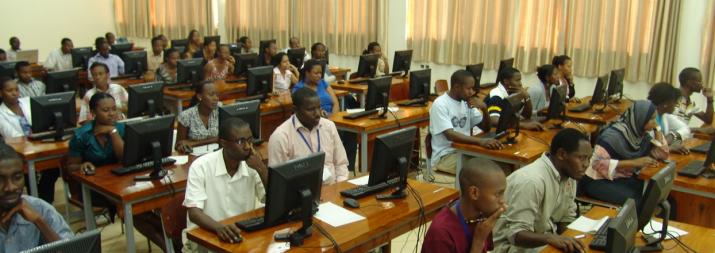
The Duke training is filling a need for building information and research literary skills in low-income countries.
Published October 25, 2011, last updated on March 5, 2013 under Education News
Health and educational institutions in low-income countries worldwide can now take advantage of free e-training materials on conducting effective scientific literature searches, thanks to a joint effort of Duke University and the World Health Organization.
The training materials, developed by the Duke Global Health Institute and the Duke Medical Center Library, include videos, exercises and self-assessment quizzes to teach faculty, staff and students in low-income countries the fundamentals of the HINARI Access to Research in Health Programme. HINARI, which is a partnership of the WHO and major publishers, gives access to one of the world’s largest collections of medical literature to institutions in more than 100 countries.
The training shows users how to find the full text of a journal article and how to do basic and advanced searches in PubMed. Developed by Duke’s Marc Sperber and Megan von Isenburg, the training also includes a glossary of key terms and sub-titles, audio files, and text transcripts to accommodate differences in language and learning styles. Designed with low-bandwidth in mind for areas where high-speed internet is not available, the training is freely accessible on the internet and offers cost-free options for downloading and ordering on CD-ROM.
“Megan and Marc’s contribution is an example of how individuals understand the value of the HINARI program and then become involved,” said Lenny Rhine, e-library training initiative coordinator with the Librarians Without Borders®/Medical Library Association. “While there are many examples of individuals conducting training, this is the first time that people have developed training material. We appreciate their contribution and expect that a number of users will benefit from this project.”
To date, most HINARI training materials are designed for trainers. The Duke training is unique because it targets end-users.
“Several HINARI training workshops are offered in different countries, but the number of participants is always limited,” said Gaby Caro, HINARI Technical Officer at the World Health Organization Library. “Countries are large and sometimes traveling to the venue is not possible. Having these short videos might help students, professors and researchers learn how to use HINARI effectively.”
“We designed this training for two types of users,” Sperber said. “The first type of user is the person who needs some just-in-time training to be able to perform a specific search-related task in HINARI, and our training’s menu provides links to short videos on very specific tasks.” Sperber said all of the training videos can be watched in less than 30 minutes. “The second type of user is more interested in an educational experience. For them, each lesson contains optional self-assessment quizzes that provide immediate instructive feedback to each response, exercises and a glossary of key terms.”
The Duke HINARI e-training series grew out of a need that Sperber and von Isenburg identified on a recent trip to DGHI partner institution Kilimanjaro Christian Medical Centre (KCMC) in Tanzania. They learned that students and faculty were not making use of the free digital library of journals, books and databases due to very low bandwidth and lack of knowledge about the existence of HINARI. With the addition of high-speed internet through a $10 million grant awarded to KCMC, it was an ideal time to introduce the HINARI training for easier access to the online resource.
Pilot participants at KCMC said the training is easy to understand and user-friendly and that it is a great resource for a medical education setting like theirs. One HINARI user said, “the training enlightened me on a very important component of my career, as a scientist. HINARI will help me know what’s happening out there in the field of medicine.” Another user said, “this training was very effective and I am honored to be among the trainees. This program will be beneficial for our institution, especially to students, because we’ll be able to access lots of material without difficulties.”
People from 51 countries have already visited the HINARI training site, and Sperber and von Isenburg have received CD-ROM requests from users in 17 countries.
Over the next 18 months, they hope to build a community of librarians, HINARI trainers and other persons who are interested in taking the open-source format of this training to translate the webpages and videos into other languages, add new lessons, and eventually make it a community effort not owned or maintained by any one institution. Already, the online version of the training uses a caption translation platform for sub-titles.
Sperber says the Duke HINARI training could also be integrated into course curriculum, either for a basic computer/internet course or a research methods course.
Many institutions in resource-poor locations around the world are eligible to subscribe to and use HINARI. See a list of countries that have access to HINARI and the Duke HINARI training. To learn more about the Duke project, visit http://hinaritraining.org/.
The Duke project was funded in part by a Framework grant from the National Institutes of Health Fogarty International Center.


